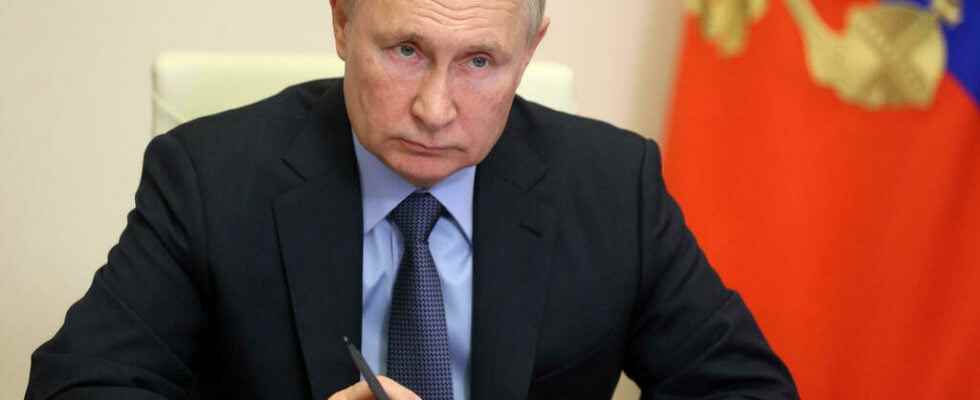After an informal meeting this Sunday evening, it is this Monday, January 10 that the Americans and Russians get to the heart of the matter in Geneva. Russia has been repeating it for weeks, it wants guarantees on security at its borders and has set the bar very high on its demands with the clear threat of a new conflict after the annexation of Crimea in 2014 and the war in the Donbass which still continues.
From our correspondent in Moscow,
Noises of boots and drum rolls. Sunday morning again Moscow affirmed ” exclude any concession », And even threatened to cut short the diplomatic session which opens if his demands are not met. Because this Monday also marks the launch of a week of high-level diplomacy in which Russia will also meet with NATO and the Organization for Security and Cooperation in Europe (OSCE).
On Sunday afternoon, Washington in turn warned Russia on ” a risk of confrontation “. Its agenda, its demands, and even its priority interlocutor – the United States -, Moscow has so far imposed its way of doing things and yet, for Dimitry Oreschkine, the West can and must refuse to give in: “ In reality, said the political scientist, Putin has no choice but to raise the ante. It loses economic competition, it loses financial, technological, scientific, cultural competition, all forms of competition in the world. The model of society he offers is not attractive. But Putin has a lot of weapons, and that’s his only asset. There is only one answer to give him: “We are not afraid”, because otherwise that would justify his tactics. If Europe is afraid, if the West is afraid, it is right to threaten. While all this is bluff, intimidation. “
► To read also: Ukraine: talks between Washington and Moscow under high tension
Possible compromises
In a very volatile situation where the slightest unintentional incident can ignite the powder, finding ways to de-escalate can already appear to be a success. Andrei Kortunov, Director General of the Russian Council for International Affairs (RIAC), said to himself “ cautiously optimistic “. “ There are possible compromises between Washington and Moscow, he explains, like agreeing not to deploy the new generation of medium-range nuclear missile in Europe. Even if unfortunately the FNI treaty is no longer in force, they can decide to respect its terms. Another possibility of compromise is a buffer zone between Russia and NATO, where special rules for military activity would apply. : a lower level of military exercises, more transparency, perhaps a direct telephone line between the armies. They can also decide to reinstate the NATO-Russia Council (COR). Even in Ukraine we can find a compromise : a clear signal from the West that it does not support a military path for the Donbass, a commitment not to deliver offensive weapons like the Turkish drones Bayraktar, and in return, Russia could be more flexible in the discussions in the Normandy format, on the modalities of application of theMinsk agreement. ”
► To read also: Ukraine: Westerners want a “diplomatic solution” but fear war
Putin ” want to send a signal “
Above all, for Andrei Kortunov, the risk-benefit balance is not in favor of an armed intervention by Russia, in particular because of the sanctions “ on a scale never seen “Promised by the United States:” We can see very well what Russia would lose in the event of an invasion of Ukraine, the collateral damage would be extremely substantial. I don’t see what Russia could gain either, and I don’t see how Russia could occupy the country and repeat what was done in Crimea: it is a very different situation. And if Vladimir Putin really wanted to invade Ukraine, he would have done it entirely differently, probably with a form of hybrid warfare. If the troop movements are so explicit and demonstrative, it is not to start a military operation, but to send a signal. “
► Read also: Ukraine: American diplomats discuss sanctions in case of Russian offensive
There remains the generational factor. Vladimir Putin who qualifies theexplosion of the USSR 30 years ago of ” greatest geopolitical disaster of the twentieth century »Has always shown it: washing away what is for him the affront of the 90s is a major objective. “ Putin is an heir to the Soviet value system, from the days when the size of the territory was a symbol of power, and control of his territories was ensured by military force. », Affirms Dimitry Oreschkine. ” So for him the objective is conquest, not development. From my point of view, this is a fundamental misunderstanding, which explains why Putin’s policies lead to a dead end. He can conquer, he can take Donbass from Ukraine, but he does not know how to develop it. He can control Kazakhstan by force, but he is not able to develop it economically, socially and culturally. For me, strategically, Putin is dragging the country into the same impasse as the Soviet communist leaders.“
And too bad if today Russian public opinion, preoccupied by galloping inflation and a sharp decline in purchasing power, does not want, in large majority, a new conflict.
